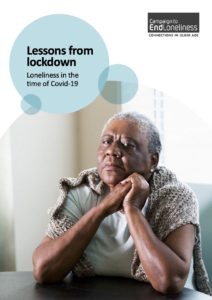In this blog, Robin Hewings, Director of the Campaign to End Loneliness, introduces our report on lessons from the experience of tackling loneliness during the first wave of the Covid-19 pandemic.
Loneliness in the time of Covid-19
The Covid-19 lockdown that started in March 2020 brought home the reality of social isolation and loneliness to the general public as never before. But many organisations had already been working to tackle loneliness for years. What could their experience tell us about the best ways to help people experiencing or at risk of loneliness and social isolation during the pandemic?
This was the question the Campaign to End Loneliness set out to answer through the Loneliness in the Time of Covid-19 series of learning webinars. We brought together hundreds of organisations from across the UK and internationally, to share their experiences, lessons and insights around addressing loneliness, and how they were applying these in lockdown.
Insight
Our new report Lessons from Lockdown sets out what we heard, offering practical guidance, hints and tips for organisations and individuals working to tackle loneliness and social isolation. We’ve also included links to additional resources shared by participants.

Building on a shared understanding of loneliness as the gap between the social connection people have, and the social connection they want, a key finding is that even when most of us are isolated, the starting point must always be to find out who is feeling lonely.
Risk categories
Certain groups of people are more at risk of loneliness, including carers, people with cognitive impairments, disabilities or long-term health conditions, and people who feel excluded or marginalised from the wider community, such as refugees, some BAME people and some LGBT+ people. The report sets out a range of approaches to reaching people who are shielding, and others who are at most risk of loneliness and isolation.
Many people suffering from loneliness during lockdown were already lonely – as one participant said, “the current crisis has been everyday life for them for many years”. It’s important to realise that loneliness and isolation are often entangled with poverty, ill health and a range of other issues, and the report highlights the importance of linking loneliness support up with other agencies.
Digital divide
Organisations have faced particular challenges in reaching people who aren’t online. We held a separate event with a focus on bridging the digital divide. The report presents a range of solutions, from providing devices or data, or support with skills and confidence, to creating offline alternatives.
We also heard about the ways that organisations supported volunteers and sustained connections and services through the long haul of lockdown. From conversation guides to online mindfulness training for volunteers, the report includes a wealth of ideas to help organisations and individuals struggling to keep things going.
Finally, the report considers the need to offer a blended offer, both online and face-to-face, well into the future. As we all adjust to new restrictions, we hope this report will be useful for organisations with long experience in this field, as well as those just beginning their work on loneliness in response to the Covid-19 pandemic.





No comments on this article yet. Please feel free to submit a comment below.
By submitting a comment you grant Campaign to End Loneliness a perpetual license to reproduce your words and name/web site in attribution. Inappropriate and irrelevant comments will be removed at an admin's discretion. Your email is used for verification purposes only, it will never be shared.